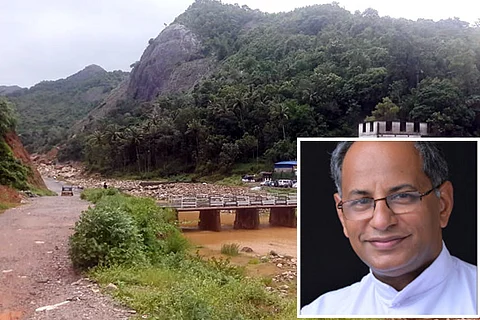

Exactly a year after the ‘flood of a century’ hit Kerala, the state is once again fighting severe upheaval induced by rains. Unlike last time, deadly landslides caused by the rains have taken a toll on the villages in the Western Ghats in northern Kerala. This has once again impelled Kerala to remember a professor, Madhav Gadgil, and a report prepared by a panel headed by him.
The report by the Western Ghats Ecology Experts Panel, commonly known as the Gadgil report, published in 2011 highlighted the ecological sensitivity of the Western Ghats. It proposed classifying regions in the Western Ghats into Ecologically Sensitive Zones (ESZs) and highlighted the need to protect the region by restricting the activities there. But many people living along the high ranges of the Western Ghats in Kerala, with the Catholic Church playing a prominent role behind protests, outright opposed the proposals and conducted multiple demonstrations against the Gadgil report, calling it impractical. Even the major political fronts of Kerala – the then ruling UDF led by the Congress and the CPI(M) led LDF in the opposition – had supported the protesters.
The uproar subsided in the subsequent months as the report was not implemented and another committee headed by K Kasturirangan was formed to examine the Gadgil report. And in the years that followed, Kerala seemed to have forgotten about Madhav Gadgil and his report on the Western Ghats, all until 2018 when the devastating deluge hit Kerala.
However, despite witnessing the recent tragedies, those who strongly opposed the Gadgil report back then still seem to be standing firm on their earlier stance.
Speaking to TNM, officials of the High Range Protection Forum (HRPF), which had conducted multiple protests against the Gadgil report, say they still vehemently oppose its proposals.
“We were not against environmental protection and never will be. All that we have been saying is that the Gadgil report was prepared without consideration for the people living in the region. We stand by that even now, it is still impractical to implement the report considering the large population living there,” says Father Sebastian Kochupurackal of the Syro Malabar church and convenor of the High Range Protection Forum.
He adds that even the then state government and the Centre had rejected the report as not feasible. “What we don’t understand is why a section of people, including media, start blaming us whenever Kerala is struck by a calamity,” he says.
Meanwhile, some political leaders have urged the state government to have a re-look at the Gadgil report recommendations. Veteran communist leader VS Achuthanandan recently stated that there was a public outcry to implement Gadgil committee recommendations in the wake of the calamities. Congress MLA PT Thomas on Thursday said that the LDF led state government and the Congress party should come forward to implement the Gadgil report. He also stressed that the Catholic Church should rethink its stance on the report.
Wayanad and Idukki already bearing the brunt
According to the Gadgil report, Wayanad and Idukki are the two districts that completely come under the highest sensitivity or Ecologically Sensitive Zone1 (ESZ1). One of the greatest tragedies of the year’s rains occurred at Wayanad’s Puthumala, when a huge mass of earth came tumbling down in a massive landslide, burying more than 18 people.
In Idukki, Peermade taluk alone saw about a hundred large and small landslides, and four mudslides. The situation was no different in the other three taluks in the district. “In Kuttikkanam-Kumily road alone, there have been over 30 landslides. Cracks have also started to appear in many places and there is fear of further landslides,” says Peermade Tahsildar Shaji.
Interestingly, protests against the Gadgil report were vehement in Idukki district. But the leaders who led the protest do not believe there is a need to rethink their stand. “It is not just the Western Ghats that is the epicentre of all the environmental problems we are witnessing. What about the floods in Chennai and Mumbai? Everything is the result of climate change, for which everyone is equally responsible. But only the activities of those living in the hills are under scrutiny,” says Fr Sebastian.
Rehabilitation ignored?
According to those who oppose the Gadgil report, what the government and the Western Ghats Ecology Expert Panel (WGEEP) which prepared the report keep neglecting is the rehabilitation of the people in the area.
“What the authorities failed to do was to take people into confidence, about how their livelihood and lives built over the years will not be affected by the proposals. Nobody has talked about rehabilitation so far, while that is more important for the people who live here. All are viewing Gadgil and Kasturirangan reports as an academic exercise. They forget that the recommendations affect the livelihood of the people,” says R Manikuttan, representative of the High Range NSS division and also a member of the High Range Protection Forum.
Though those opposing the Gadgil report keep saying that locals are not involved, an analysis of the report states the opposite. “WGEEP believes that it is inappropriate to depend exclusively on Government agencies for constitution and management of ESZs. It must be based on extensive inputs from local communities and local bodies, namely, Gram Panchayats, Taluka Panchayats, Zilla Parishads, and Nagarpalikas, under the overall supervision of the Western Ghats Ecology Authority (WGEA), State level Ecology Authorities and District Ecology Committees,” (page 40 of the WGEEP Report 2011).
Also read: